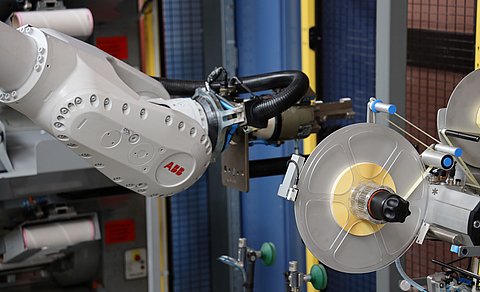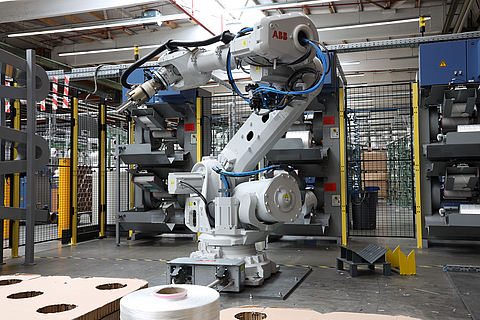Gescher (Westphalia/Germany) September 2021: Automation with robots has long since found its way into many sectors. One of the world's leading manufacturers of technical high-performance textiles for civil engineering, agriculture, industry and lightweight construction, the HUESKER Group, recently discovered the advantages that robotics can also make in niches. Together with ABB, a pioneer in robotics and automation, HUESKER developed a prototype that is not available off the shelf, which is specifically used for handling and palletizing heavy yarn reels - a relief for the employees in yarn production.
In one of its production plants, which produces base yarn also made from 100% recycled materials, the HUESKER Group now relies on the support of a robot. In doing so, the company ventured into unfamiliar territory. “Recently, we have been giving a lot of thought to how to apply robotics and automation in the best possible way for us and our personnel,” says Dr. F.- Hans Grandin, Chairman of the Management Board of HUESKER Group.
“When it comes to handling and palletizing twine reels, which can weigh up to 17 kilograms each, the advantages are clear - robots relieve our employees of this strenuous job and give them the opportunity to take on other important tasks.”
Thus, HUESKER's first automation project was quickly set in motion. In cooperation with ABB, a robot was recently implemented which, in addition to high performance, also has particularly low operating costs. The robot reliably picks up the finished yarn reels from three production machines, which are each fitted with two removal troughs. The troughs are located in different positions - all of which are unergonomic positions for the employees. In addition, depending on the production order, the yarn spools can differ in diameter and weight. This is no problem for the robot, which can handle payloads up to 150 kilograms. On average, it takes around 2.5 tons per day off the shoulders of the employees.
Never lose the thread
The robot can even cope with more delicate work: each finished manufactured reel of yarn has an open thread end that has to be secured to prevent unwinding on the pallet. To do this, the robot passes the reel to a machining station where an adhesive label is applied to fasten the thread. Another issue is that the automatic reel swap leaves the so-called ‘yarn reserve’ protruding, which is not needed in the next processing steps. To remove this, the robot moves the reel to yet another device where the thread is burned off with a heating wire and discarded.
The next step is palletization. The robot starts by placing the reels upright on a pallet. As soon as a level is fully packed, it takes an intermediate layer from a hopper and fits it on top of the first layer. The robot also takes empty cores from a large dispenser and passes them on to the spooling stations to help keep production flowing.
Continuous, nearly autonomous operation and quick commissioning
Employees simply need to monitor the robot and assist occasionally, such as when a ready pallet needs to be transported away, intermediate layers need to be restocked or empty cores need to be refilled. None of these tasks take long and occur only once or twice during a shift. Apart from these short interruptions, the entire system runs nearly autonomously.
First-time robot user in the niche – focus on in-house knowledge development
“We have turned this automation system into a prototype, which we can now mirror in other systems on a nearly one-to-one basis,” says Heinz-Georg Richels, Technical Manager and Authorized Representative at HUESKER.
"We are using the lessons learned to build further knowledge for robotics in this special field of application. This is because handling thread in synthetic materials is a very complex requirement, for which there are no off-the-shelf systems available.”
As a first-time robotics user, the company is seeking to implement most of the robot cells independently.
A blueprint for future projects
After the successful implementation of its first automation system, HUESKER sees plenty of potential for the use of robotics in additional applications, such as for processes upstream of actual twine production. In this manner, continuous automation lines will be created which will help the company boost productivity and flexibility, as well as further enhance working conditions for employees.
“We are a highly specialized operation, so accordingly any new robot cells we build will be prototypes. To this end, we need personnel that are well educated and want to further deepen their knowledge. The fact that we are already using robotics now helps us win over young professionals who are on the lookout for attractive jobs, and then keep them in the long-term. And of course, we continue to place our trust here on strong partners like ABB,” concludes Dr. Grandin.
About ABB:
ABB (ABBN: SIX Swiss Ex) is a leading technology company that vigorously promotes the transformation of business and industry into a more productive and sustainable future all over the world. Thanks to the connection of its portfolio in the areas of electrification, robotics, automation and drive technology with software, ABB defines the boundaries of technological feasibility and thus enables new peak performance. ABB looks back at a successful history spanning over 130 years. The success of the company is based on the talent of its nearly 105,000 employees in more than 100 countries. www.abb.com
About ABB Robotics & Discrete Automation:
ABB Robotics & Discrete Automation is a pioneer is the area of robotics, machine automation as well as digital services, and offers innovative solutions for a variety of sectors, spanning from the automotive industry to the electronics industry and logistics. As one of the leading global suppliers of robotics and machine automation, we have provided over 500,000 robotics solutions. We help our customers of all sizes increase their productivity and flexibility, simplify processes and improve product quality. Moreover, we support them on the path to networked and collaborative factories of the future. ABB Robotics & Discrete Automation employs a staff of over 10,000 people at over 100 sites in more than 53 countries. www.abb.com/robotics

